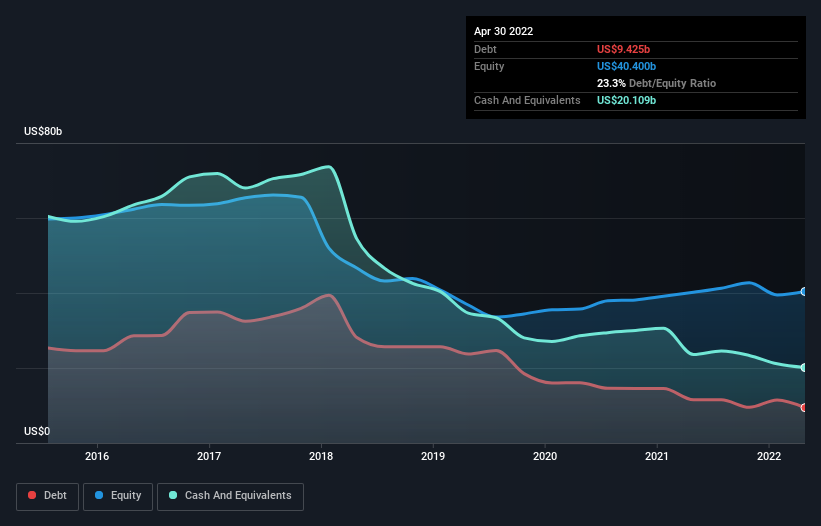Cisco Systems (NASDAQ:CSCO) Has A Rock Solid Balance Sheet
The external fund manager backed by Berkshire Hathaway's Charlie Munger, Li Lu, makes no bones about it when he says 'The biggest investment risk is not the volatility of prices, but whether you will suffer a permanent loss of capital.' When we think about how risky a company is, we always like to look at its use of debt, since debt overload can lead to ruin. We note that Cisco Systems, Inc. (NASDAQ:CSCO) does have debt on its balance sheet. But the more important question is: how much risk is that debt creating?
What Risk Does Debt Bring?
Debt assists a business until the business has trouble paying it off, either with new capital or with free cash flow. Ultimately, if the company can't fulfill its legal obligations to repay debt, shareholders could walk away with nothing. However, a more common (but still painful) scenario is that it has to raise new equity capital at a low price, thus permanently diluting shareholders. Of course, plenty of companies use debt to fund growth, without any negative consequences. When we think about a company's use of debt, we first look at cash and debt together.
View our latest analysis for Cisco Systems
What Is Cisco Systems's Net Debt?
As you can see below, Cisco Systems had US$9.43b of debt at April 2022, down from US$11.5b a year prior. But it also has US$20.1b in cash to offset that, meaning it has US$10.7b net cash.
How Strong Is Cisco Systems' Balance Sheet?
Zooming in on the latest balance sheet data, we can see that Cisco Systems had liabilities of US$24.2b due within 12 months and liabilities of US$28.2b due beyond that. Offsetting these obligations, it had cash of US$20.1b as well as receivables valued at US$9.59b due within 12 months. So its liabilities total US$22.7b more than the combination of its cash and short-term receivables.
Since publicly traded Cisco Systems shares are worth a very impressive total of US$184.1b, it seems unlikely that this level of liabilities would be a major threat. However, we do think it is worth keeping an eye on its balance sheet strength, as it may change over time. Despite its noteworthy liabilities, Cisco Systems boasts net cash, so it's fair to say it does not have a heavy debt load!
Fortunately, Cisco Systems grew its EBIT by 4.7% in the last year, making that debt load look even more manageable. The balance sheet is clearly the area to focus on when you are analysing debt. But it is future earnings, more than anything, that will determine Cisco Systems's ability to maintain a healthy balance sheet going forward. So if you want to see what the professionals think, you might find this free report on analyst profit forecasts to be interesting.
Finally, a company can only pay off debt with cold hard cash, not accounting profits. Cisco Systems may have net cash on the balance sheet, but it is still interesting to look at how well the business converts its earnings before interest and tax (EBIT) to free cash flow, because that will influence both its need for, and its capacity to manage debt. Happily for any shareholders, Cisco Systems actually produced more free cash flow than EBIT over the last three years. That sort of strong cash generation warms our hearts like a puppy in a bumblebee suit.
Summing Up
While Cisco Systems does have more liabilities than liquid assets, it also has net cash of US$10.7b. And it impressed us with free cash flow of US$14b, being 100% of its EBIT. So we don't think Cisco Systems's use of debt is risky. We'd be very excited to see if Cisco Systems insiders have been snapping up shares. If you are too, then click on this link right now to take a (free) peek at our list of reported insider transactions.
At the end of the day, it's often better to focus on companies that are free from net debt. You can access our special list of such companies (all with a track record of profit growth). It's free.
Have feedback on this article? Concerned about the content? Get in touch with us directly. Alternatively, email editorial-team (at) simplywallst.com.
This article by Simply Wall St is general in nature. We provide commentary based on historical data and analyst forecasts only using an unbiased methodology and our articles are not intended to be financial advice. It does not constitute a recommendation to buy or sell any stock, and does not take account of your objectives, or your financial situation. We aim to bring you long-term focused analysis driven by fundamental data. Note that our analysis may not factor in the latest price-sensitive company announcements or qualitative material. Simply Wall St has no position in any stocks mentioned.
Join A Paid User Research Session
You’ll receive a US$30 Amazon Gift card for 1 hour of your time while helping us build better investing tools for the individual investors like yourself. Sign up here

